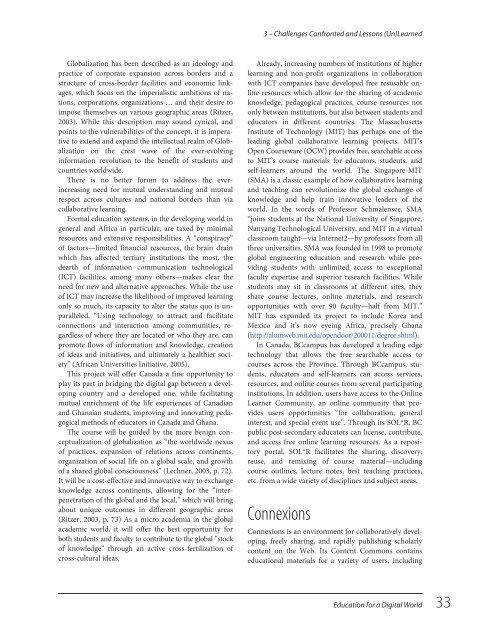Education for a Digital World Advice, Guidelines and Effective Practice from Around Globe, 2008a
Education for a Digital World Advice, Guidelines and Effective Practice from Around Globe, 2008a
Education for a Digital World Advice, Guidelines and Effective Practice from Around Globe, 2008a
Create successful ePaper yourself
Turn your PDF publications into a flip-book with our unique Google optimized e-Paper software.
3 – Challenges Confronted <strong>and</strong> Lessons (Un)Learned<br />
Globalization has been described as an ideology <strong>and</strong><br />
practice of corporate expansion across borders <strong>and</strong> a<br />
structure of cross-border facilities <strong>and</strong> economic linkages,<br />
which focus on the imperialistic ambitions of nations,<br />
corporations, organizations … <strong>and</strong> their desire to<br />
impose themselves on various geographic areas (Ritzer,<br />
2003). While this description may sound cynical, <strong>and</strong><br />
points to the vulnerabilities of the concept, it is imperative<br />
to extend <strong>and</strong> exp<strong>and</strong> the intellectual realm of Globalization<br />
on the crest wave of the ever-evolving<br />
in<strong>for</strong>mation revolution to the benefit of students <strong>and</strong><br />
countries worldwide.<br />
There is no better <strong>for</strong>um to address the everincreasing<br />
need <strong>for</strong> mutual underst<strong>and</strong>ing <strong>and</strong> mutual<br />
respect across cultures <strong>and</strong> national borders than via<br />
collaborative learning.<br />
Formal education systems, in the developing world in<br />
general <strong>and</strong> Africa in particular, are taxed by minimal<br />
resources <strong>and</strong> extensive responsibilities. A “conspiracy”<br />
of factors—limited financial resources, the brain drain<br />
which has affected tertiary institutions the most, the<br />
dearth of in<strong>for</strong>mation communication technological<br />
(ICT) facilities, among many others—makes clear the<br />
need <strong>for</strong> new <strong>and</strong> alternative approaches. While the use<br />
of ICT may increase the likelihood of improved learning<br />
only so much, its capacity to alter the status quo is unparalleled.<br />
“Using technology to attract <strong>and</strong> facilitate<br />
connections <strong>and</strong> interaction among communities, regardless<br />
of where they are located or who they are, can<br />
promote flows of in<strong>for</strong>mation <strong>and</strong> knowledge, creation<br />
of ideas <strong>and</strong> initiatives, <strong>and</strong> ultimately a healthier society”<br />
(African Universities Initiative, 2005).<br />
This project will offer Canada a fine opportunity to<br />
play its part in bridging the digital gap between a developing<br />
country <strong>and</strong> a developed one, while facilitating<br />
mutual enrichment of the life experiences of Canadian<br />
<strong>and</strong> Ghanaian students, improving <strong>and</strong> innovating pedagogical<br />
methods of educators in Canada <strong>and</strong> Ghana.<br />
The course will be guided by the more benign conceptualization<br />
of globalization as “the worldwide nexus<br />
of practices, expansion of relations across continents,<br />
organization of social life on a global scale, <strong>and</strong> growth<br />
of a shared global consciousness” (Lechner, 2003, p. 72).<br />
It will be a cost-effective <strong>and</strong> innovative way to exchange<br />
knowledge across continents, allowing <strong>for</strong> the “interpenetration<br />
of the global <strong>and</strong> the local,” which will bring<br />
about unique outcomes in different geographic areas<br />
(Ritzer, 2003, p. 73) As a micro academia in the global<br />
academic world, it will offer the best opportunity <strong>for</strong><br />
both students <strong>and</strong> faculty to contribute to the global “stock<br />
of knowledge” through an active cross-fertilization of<br />
cross-cultural ideas.<br />
Already, increasing numbers of institutions of higher<br />
learning <strong>and</strong> non-profit organizations in collaboration<br />
with ICT companies have developed free resusable online<br />
resources which allow <strong>for</strong> the sharing of academic<br />
knowledge, pedagogical practices, course resources not<br />
only between institutions, but also between students <strong>and</strong><br />
educators in different countries. The Massachusetts<br />
Institute of Technology (MIT) has perhaps one of the<br />
leading global collaborative learning projects. MIT’s<br />
Open Courseware (OCW) provides free, searchable access<br />
to MIT’s course materials <strong>for</strong> educators, students, <strong>and</strong><br />
self-learners around the world. The Singapore-MIT<br />
(SMA) is a classic example of how collaborative learning<br />
<strong>and</strong> teaching can revolutionize the global exchange of<br />
knowledge <strong>and</strong> help train innovative leaders of the<br />
world. In the words of Professor Schmalensee, SMA<br />
“joins students at the National University of Singapore,<br />
Nanyang Technological University, <strong>and</strong> MIT in a virtual<br />
classroom taught—via Internet2—by professors <strong>from</strong> all<br />
three universities. SMA was founded in 1998 to promote<br />
global engineering education <strong>and</strong> research while providing<br />
students with unlimited access to exceptional<br />
faculty expertise <strong>and</strong> superior research facilities. While<br />
students may sit in classrooms at different sites, they<br />
share course lectures, online materials, <strong>and</strong> research<br />
opportunities with over 90 faculty—half <strong>from</strong> MIT.”<br />
MIT has exp<strong>and</strong>ed its project to include Korea <strong>and</strong><br />
Mexico <strong>and</strong> it’s now eyeing Africa, precisely Ghana<br />
(http://alumweb.mit.edu/opendoor/200011/degree.shtml).<br />
In Canada, BCcampus has developed a leading edge<br />
technology that allows the free searchable access to<br />
courses across the Province. Through BCcampus, students,<br />
educators <strong>and</strong> self-learners can access services,<br />
resources, <strong>and</strong> online courses <strong>from</strong> several participating<br />
institutions. In addition, users have access to the Online<br />
Learner Community, an online community that provides<br />
users opportunities “<strong>for</strong> collaboration, general<br />
interest, <strong>and</strong> special event use”. Through its SOL*R, BC<br />
public post-secondary educators can license, contribute,<br />
<strong>and</strong> access free online learning resources. As a repository<br />
portal, SOL*R facilitates the sharing, discovery,<br />
reuse, <strong>and</strong> remixing of course material—including<br />
course outlines, lecture notes, best teaching practices,<br />
etc. <strong>from</strong> a wide variety of disciplines <strong>and</strong> subject areas.<br />
Connexions<br />
Connexions is an environment <strong>for</strong> collaboratively developing,<br />
freely sharing, <strong>and</strong> rapidly publishing scholarly<br />
content on the Web. Its Content Commons contains<br />
educational materials <strong>for</strong> a variety of users, including<br />
<strong>Education</strong> <strong>for</strong> a <strong>Digital</strong> <strong>World</strong> 33


















